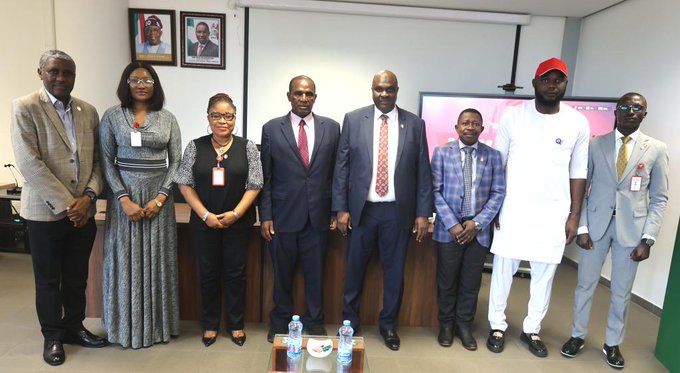The Economic and Financial Crimes Commission (EFCC) has pledged to collaborate with the Presidential Special Committee on Campaign Against Social Vices in Secondary and Tertiary Institutions to curb economic and financial crimes among students.
The EFCC’s Chairman, Ola Olukoyede, represented by the Director of Fraud Risks Assessment and Control, Commander of the EFCC, CE Ibrahim Shazali, stated this during a courtesy visit by the Committee’s Chairman, Professor Jerry Ugokwe, and his team to the EFCC headquarters in Abuja.
Olukoyede affirmed the Commission’s commitment to instilling integrity and ethical conduct in schools.
READ ALSO: Groups support EFCC, govt efforts to recover N5.7bn from Sujimoto over Smart Green Schools
He noted that the EFCC has a long-standing initiative of establishing Integrity Clubs in primary and secondary schools and Zero Tolerance Clubs in higher learning institutions to encourage good values among students and protect them from corrupt practices.
He highlighted that the EFCC’s focus is on preventive measures, such as sensitisation and re-orientation, which he described as an efficient and cost-effective approach to fighting corruption.
He recalled that he had emphasised this preventive framework during his Senate screening.
Olukoyede acknowledged that social vices like drug abuse, cybercrime, alcoholism, and cultism can lead to corrupt practices.
He expressed the Commission’s readiness to provide full support to the committee and suggested a synergy with the EFCC’s existing clubs to streamline collaborative efforts.
However, Ugokwe stressed that a sustainable fight against corruption requires building strong values in the younger generation.
He explained that the Committee’s mandate is to design, coordinate, and execute a comprehensive national campaign against social vices in educational institutions.
READ ALSO: EFCC declares Sujimoto wanted for money laundering
He outlined the committee’s four key pillars: awareness and sensitisation, capacity building and training, policy and advocacy, and collaboration and enforcement support.
Ugokwe called on the EFCC to maintain its anti-corruption efforts, suggesting joint campus sensitisation programmes, anti-corruption clubs, annual anti-corruption essay competitions, and media campaigns as ways to solidify gains in the fight against vices.



